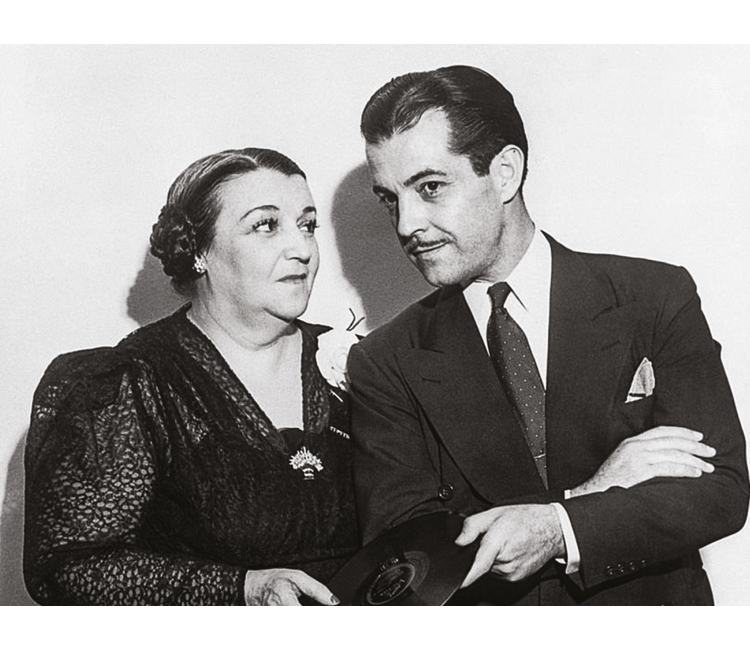
María Grever was a pioneering Mexican composer who received acclaim and international recognition for her many works that went on to be covered by some of the biggest performers of the time. You might know María Grever’s popular song What A Difference A Day Makes, translated from its original Cuando vuelva a tu lado, that went on to win a Grammy in 1959 as sung by Jazz legend Dinah Washington. Grever was not a ‘one hit wonder’ by any means, as her numerous musical successes demonstrate.
María Grever (1885-1951) was born María Joaquina de la Portilla Torres in Mexico to a Spanish father and Mexican mother. She demonstrated a musical talent early on in life, and composed a Christmas carol at just four years old. Upon moving to her father’s hometown of Seville in 1891, Grever studied under the great composers Claude Debussy and Franz Lenhard before pursuing music school back in Mexico in 1900.
Grever released her first record in 1912 titled, A Una Ola (To A Wave) which sold millions of copies and went on to be covered by numerous artists. In 1907, she married American oil executive Leo A. Grever, and the couple moved to the USA permanently in 1916.
https://www.youtube.com/watch?v=Z2br-Ha-xkA&feature=emb_title
Living in New York, Grever continued to compose, and began working for Paramount Pictures and 20th Century Fox, writing background music for film. But it was Grever’s captivating other works combining traditional folk rhythms, tango, and bolero styles that endeared her to audiences not only in the US but also internationally in Latin America and Europe. Grever wrote over 800 songs and was rumoured to have perfect pitch.
https://www.youtube.com/watch?v=3pFF7dqHv0o&list=PLQNz-244gtB9AbLhFHt05_sTEXIvaBBML
“I had to leave my country, and now in New York I am interested in Jazz and Modern Rhythms, but above all, in Mexican Music, which I long to present to the American people. I am afraid they don’t know much about it. It is music worth spreading; there is such a cultural richness in Mexican Music (its Hispanic and indigenous origins and how they mix) where melody and rhythm merge. It is my wish and yearning to present the native rhythms and tunes (of Mexico) from a real perspective, but with the necessary flexibility to appeal to the universal audience.” – María Grever
Grever’s first international hit was Júrame (Promise, Love), a habanera-bolero, performed by tenor José Mojica, and was followed by Volveré (I Will Return) Te quiero, dijiste (Magic Is the Moonlight), which was written for the 1944 Esther Williams film Bathing Beauty, Cuando vuelva a tu lado (When I Return To Your Side) and Por si no te vuelvo a ver (What if I see you again). Other songs include Tipitipitin (recorded as “Ti-Pi-Tin” by the Andrews Sisters), Para Qué Recordar, Ya No Me Quieres, Tú, Tú y Tú (as recorded by Mexican tenor Juan Arvizu in 1928), Qué Dirías de Mi, Eso Es Mentíra, Mi Secreto, Dame Tu Amor, Una Rosa, Un Beso, Despedida, Así , Chamaca Mía, Todo Mi Ser, and Alma Mía.

María Grever died in New York in 1951 after a prolonged illness, and requested that she be laid to rest in Mexico City. Although this formidable woman had gone too soon, she was not to be forgotten in the years that followed.
In recognition of her contributions to music, the Union of Women of the Americas (UWA) named Grever ‘Woman of the Americas’ in 1952. In 1953, Argentine singer-actress and Latin America star Libertad Lamarque portrayed Grever in Cuando me valla (When I Leave), a biopic directed by Tito Davison.
Three years later, Lamarque released a best-selling tribute to Grever’s most popular songs titled Libertad Lamarque canta canciones de María Grever.
With Dinah Washington’s 1959 rendition of What A Difference A Day Makes, Grever won a posthumous Grammy Award, and the recording was inducted into the Grammy Hall of Fame in 1998.
Although her name may be somewhat overlooked in modern times, the music very much lives on, with her memorable style still very well-loved, well-known and often performed into the 21st Century. María Grever, we thank you for the music.
The Human Library: Check Out Real People
Ali Wright Photographs Theatre Staff Working As Key Staff during COVID


Michelle is a musician and composer from the UK. She has performed across the UK and Europe and is passionate about arts education and opportunities for women and girls.
Read Full Profile© 2021 TheatreArtLife. All rights reserved.

Thank you so much for reading, but you have now reached your free article limit for this month.
Our contributors are currently writing more articles for you to enjoy.
To keep reading, all you have to do is become a subscriber and then you can read unlimited articles anytime.
Your investment will help us continue to ignite connections across the globe in live entertainment and build this community for industry professionals.